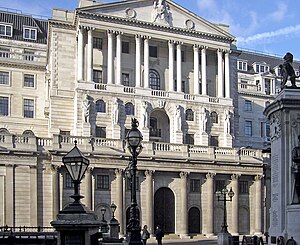Second Homes and Capital Gains Tax
 The Bank of England - not my second home. Image via Wikipedia
The Bank of England - not my second home. Image via WikipediaAt the weekend, David Cameron is reported to have said that second home ownership was not "splendid" for the economy. Of course, in many areas there are concerns that second home owners are pricing out the locals who have to move far away - fishermen can no longer afford Fisherman's Cottage, and the local vicars can barely afford the new Rectory, let alone the Old Rectory which was sold off years ago.
But without going into the rights or wrongs of second home ownership, the idea that somehow these people will "suffer" if their GAIN on the sale of the property is taxed at the same rate of income is quite bizarre. Property ownership in the UK has been, over the long term, a good one-way bet for many years. There is no risk taking with this sort of "investment", which is, to coin a phrase, as safe as houses. Although frankly, the idea that a second home (as opposed to a buy-to-let investment) is in fact an "investment" is pretty odd.
On the other hand, it was the last Labour government (hiss, boo) which created the anomaly of taxing captial gains at a lower rate to income (whether earned or not) and did away with many of the distinctions between business and non-business assets - and dismantled the reliefs (taper and indexation) which rewarded those who held investments for the long term. Instead the new 18% rate was available for any asset, no matter how long it had been held. This encouraged some people to arrange their affairs so that income became a capital gain (and taxed accordingly) or to invest for capital growth rather than a steady income return - which surely pushed up property prices.
So when George Osborne looks at the detail of the CGT realignment with Income Tax, it would be extremely sensible if taper relief and indexation allowances are restored, and that the exemptions, such as Entrepreneurs Relief and schemes such as the Enterprise Investment Scheme are maintained to encourage investment in real businesses. As CGT rates rise, these schemes will make investment in real businesses all the more attractive, which should be widely welcomed.
![Reblog this post [with Zemanta]](http://img.zemanta.com/reblog_e.png?x-id=39905c76-7ed9-45ed-92d2-71a9af5d4282)

![Reblog this post [with Zemanta]](http://img.zemanta.com/reblog_e.png?x-id=a82a6c07-57a6-4582-944a-e5ca8707f728)
